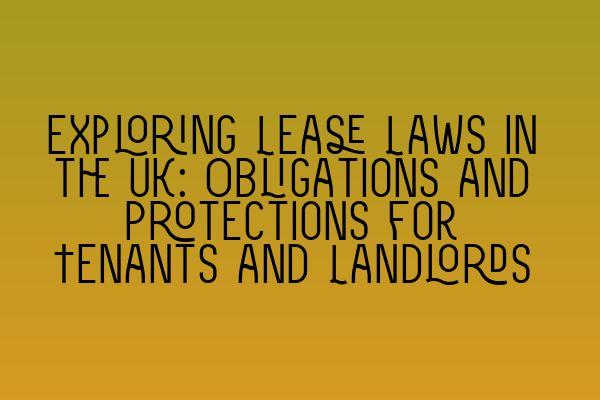Exploring Lease Laws in the UK: Obligations and Protections for Tenants and Landlords
Lease laws in the UK are an essential component of property law, providing the necessary framework to govern the relationship between landlords and tenants. Whether you are a tenant looking for a property to rent or a landlord intending to let out your property, understanding lease laws is crucial to ensure proper obligations and protections for both parties.
In this article, we will delve into the key aspects of lease laws in the UK, highlighting the rights and responsibilities of tenants and landlords and how these can affect your property transactions. So, let’s begin our exploration of lease laws.
Types of Leases
Before we dive into the legal obligations and protections, let’s first familiarize ourselves with the different types of leases. In the UK, the most common types of leases include:
- Assured Shorthold Tenancy (AST)
- Assured Tenancy
- Regulated Tenancy
- Fixed-term Lease
- Periodic Lease
Each type of lease comes with its own set of rules and regulations, which determine the length of the tenancy, notice periods, and other relevant factors. It is crucial for both tenants and landlords to understand the type of lease they are entering into to ensure compliance with the applicable laws.
Tenant Obligations and Protections
Tenants in the UK have specific obligations that they must fulfill throughout the tenancy period. These obligations typically include paying rent on time, maintaining the property in a good condition, and adhering to any rules and regulations set out in the lease agreement.
One of the primary protections tenants have is the right to live in a safe and habitable property. Landlords are obligated to ensure that the property meets certain health and safety standards, including proper maintenance of the property, functioning utilities, and compliance with building regulations.
Tenants also have protection against unfair eviction. Landlords must follow the proper legal procedures and provide valid grounds for eviction, such as non-payment of rent, breach of lease terms, or the need to personally occupy the property. It is important for tenants to be aware of their rights and seek legal advice if they feel their rights are being violated.
If you want to learn more about tenant rights and protections in the UK, check out this article: Understanding Contractual Capacity: Rights and Limitations.
Landlord Obligations and Protections
Landlords also have specific obligations and responsibilities towards their tenants. These include providing a safe and well-maintained property, ensuring all necessary repairs are carried out in a timely manner, and protecting the tenant’s deposit in a government-approved tenancy deposit scheme.
Landlords have the right to receive rent payments on time and take legal action against tenants who fail to fulfill their payment obligations. However, they must also respect the tenant’s right to privacy and provide adequate notice before entering the property for inspections or repairs.
To protect their interests, landlords may also include clauses in the lease agreement regarding restrictions on subletting, noise levels, and property use. However, it is important for landlords to ensure these clauses are fair and reasonable, as certain terms may be deemed unenforceable by the courts.
If you are a landlord seeking more insights and guidance on lease laws, you may find this article useful: SQE Prep: Mastering the Essentials of Contract Law.
Dispute Resolution and Legal Remedies
Disputes between landlords and tenants can arise, ranging from rent arrears and property damage to disagreements over lease terms. In such cases, it is advisable for both parties to seek amicable resolutions through negotiation or mediation.
If a resolution cannot be reached, legal remedies are available to landlords and tenants. Tenants can seek redress through the courts if their rights have been violated, while landlords can pursue legal action to recover unpaid rent or evict tenants in accordance with the law.
It is important to note that lease laws are constantly evolving, and it is essential to stay updated with any changes in legislation or case law. Keeping yourself informed can help prevent disputes and ensure a smooth and legally sound tenancy.
For a comprehensive analysis of landmark cases and influential judicial decisions related to contract law, including lease laws, check out this article: SQE Contract Law: Analyzing Landmark Cases and Influential Judicial Decisions.
Conclusion
Lease laws in the UK provide the necessary guidelines and protections for both tenants and landlords. Understanding these laws is vital for ensuring a fair and mutually beneficial relationship between the parties involved. Whether you are a tenant or a landlord, familiarizing yourself with your rights and obligations can help you navigate the complexities of lease agreements and avoid potential legal pitfalls.
At SQE Property Law & Land Law, we offer expert legal advice and guidance in all areas of property law. Stay informed and join our SQE Contract Law webinars to gain insights into lease laws and other essential aspects of contract law. Check out our website for more information on our services and our interactive SQE mock tests for contract law.
